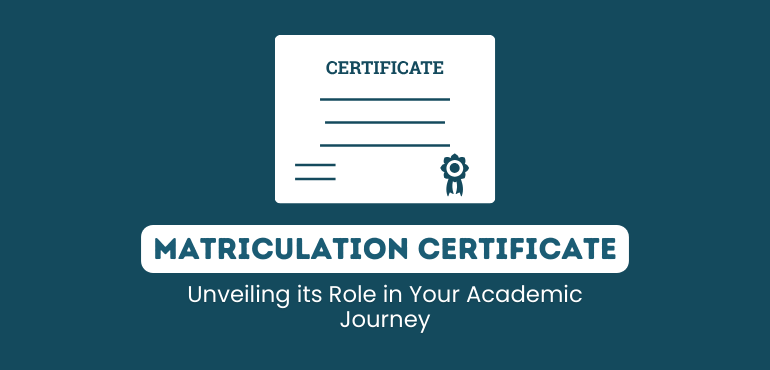
Our elders and seniors have always talked about their matriculation to us. They have always spoken to us about their marks and academic transcripts. Have you ever been anxious to know about the importance and purpose of a matriculation certificate?
We will go into greater detail about this certificate’s real contents as well as the several education bodies that issue it in this blog. For further information regarding the specifics of a matriculation certificate, check out this blog.
What is a Matriculation Certificate?
A matriculation certificate, also known as the Secondary School Certificate, is a certificate of evidence awarded to students who have successfully cleared their class 10th examination, unlike the bonafide certificate, which is issued when a student is transitioning from one education board to another.
The matriculation examinations are indeed one of the most common and entry-level examinations in India. This is because the number of seats for students enrolled in class 10th is generally more than the number of pupils enrolled in class 11th, making the matriculation certificate and matriculation examinations the most common and accepted in India.
Having said that, clearing this introductory level of education (matriculation examinations) is extremely important in India as it’s rightfully considered the gateway to all other educational openings for our country’s pupils. Indeed, if the scholars wish to study further in classes 11th and 12th or want to pursue an ITI course, completing matriculation examinations and earning a matriculation certificate is of utmost significance and obligatory.
Types of Boards to Issue Matriculation Certificates
The Indian educational boards that the student has enrolled in or is currently attending issue the matriculation certificate. The following are India’s most well-known educational boards:
CBSE
The Central Board of Secondary Education (CBSE) is one of the most well-known educational boards in India. It is a government-owned board that offers education from kindergarten to class 12. All universities and colleges in India recognize the CBSE matriculation certificate.
CISCE or ICSE
The Council for the Indian School Certificate Examinations (CISCE) is another well-known educational board in India. It is a private board that offers education from kindergarten to class 12. The CISCE matriculation certificate is also recognized by all universities and colleges in India.
NIOS
The National Institute of Open Schooling (NIOS) is an open learning school that offers education from middle school to senior secondary level. The NIOS matriculation certificate is recognized by all universities and colleges in India.
State Boards of Education
In addition to the three national boards, there are also 28 state boards of education in India. Each state board offers its own matriculation certificate, which is recognized by universities and colleges in the respective state.
Here is a table summarizing the different types of boards that issue matriculation certificates in India:
| Board | Type | Recognition |
|---|---|---|
| CBSE | Government | All universities and colleges in India |
| CISCE | Private | All universities and colleges in India |
| NIOS | Open learning | All universities and colleges in India |
| State Boards of Education | State-level | Universities and colleges in the respective state |
Importance of Matriculation Certificate
Importance refers to the broader significance and value of a matriculation certificate within the Indian education system and society. It emphasizes the role of the matriculation certificate as a:
- Benchmark of Basic Education: Matriculation serves as a widely recognized standard of fundamental literacy, numeracy, and essential knowledge.
- Foundation for Further Learning: It provides a solid base for pursuing higher education and lifelong learning opportunities.
- Gateway to Personal and Professional Growth: Matriculation empowers individuals to make informed decisions, navigate challenges, and contribute meaningfully to society.
- Symbol of Personal Achievement: Successfully completing secondary education and earning a matriculation certificate is a significant personal milestone.
Benefits of Matriculation Certificate
Benefits refer to the tangible advantages that a matriculation certificate holder can directly experience. These benefits include:
- Access to Higher Education: Matriculation certificate holders are eligible to apply for undergraduate programs in most universities and colleges in India.
- Improved Employment Prospects: A matriculation certificate is often a minimum requirement for entry-level positions in various industries
- Enhanced Personal Development: Knowledge and abilities developed in secondary school promote the growth of critical thinking, problem-solving, and intellectual advancement.
- Increased Social Recognition: Obtaining a matriculation certificate is valued in Indian society and can lead to greater respect and admiration.
Eligibility Criteria for Matriculation Certificate
The eligibility criteria in India vary slightly depending on the specific board of education issuing the matriculation certificate; these eligibility criteria don’t apply to obtaining a migration certificate. However, the general requirements remain consistent across most boards.
- Completion of Class 10 Education: A student must have successfully completed their class 10 education for obtaining a matriculation certificate. This typically involves passing the class 10 board examination conducted by the respective board of education.
- Age Requirement: Most boards have a minimum age requirement for appearing in the class 10 board examination and obtaining a matriculation certificate. The age limit varies slightly, but it generally falls between 15 and 17 years old.
- Academic Performance: To qualify for a matriculation certificate, students must achieve a minimum passing grade in all subjects or a specified overall percentage in the class 10 board examination. The passing marks and percentage criteria may vary depending on the board of education.
- Regular Attendance: Maintaining regular attendance throughout the academic year is typically mandatory for eligibility to appear in the class 10 board examination and receive a matriculation certificate. Some boards may have specific attendance requirements, such as a minimum percentage of attendance.
- Subject Requirements: The specific subjects required to obtain a matriculation certificate vary depending on the board of education. However, most boards mandate a core set of subjects, such as English, Hindi, Mathematics, Science, and Social Studies. Additional subjects may be required or optional based on the board’s curriculum.
- Character Certificate: Some boards may require students to submit a character certificate from their school or institution as part of the eligibility criteria for a matriculation certificate. This certificate attests to the student’s good conduct and behavior during their school years.
- Residence Requirements: In some cases, boards may impose residence requirements for students seeking a matriculation certificate. These requirements may involve residing within the jurisdiction of the board or having studied at a school affiliated with the board for a specified period.
- Additional Requirements: Some boards may have additional eligibility criteria, such as submitting migration certificates for students transferring from other boards or providing proof of identity documents. It is crucial to check with the specific board of education for their detailed eligibility requirements.
Conclusion
In conclusion, the matriculation certificate serves as a ticket to a better future rather than only a record of academic achievement. It provides individuals with the self-assurance to pursue advanced education, enhance their employability, contribute significantly to society, and negotiate their personal ambitions.








